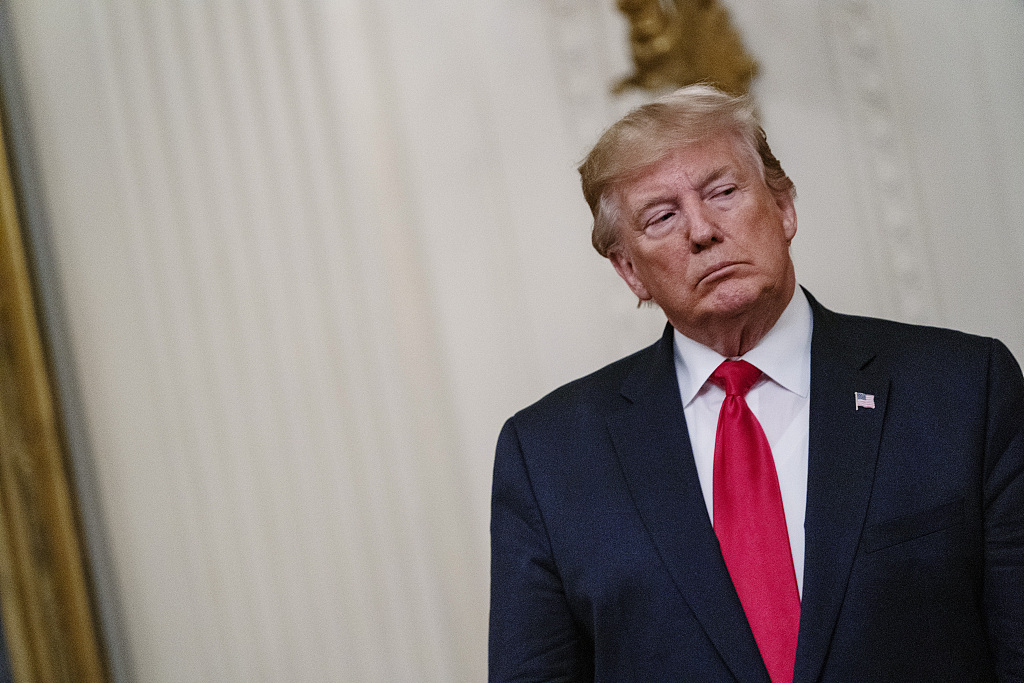
Speaker of the U.S. House of Representatives Nancy Pelosi is a staunch supporter of the Hong Kong Human Rights and Democracy Act, which was passed on November 21 and sent it to President Donald Trump for his signature. /VCG Photo
Speaker of the U.S. House of Representatives Nancy Pelosi is a staunch supporter of the Hong Kong Human Rights and Democracy Act, which was passed on November 21 and sent it to President Donald Trump for his signature. /VCG Photo
Editor's Note: Huang Jiyuan is an opinion editor with CGTN Digital. The article reflects the author's opinions, and not necessarily the views of CGTN.
Before reacting instinctively to the title, I'd like to ask the reader to consider the following sentence describing a research paper written by a group of international academics: "… an amazing field experiment encouraging Hong Kong university students into participation in an anti-authoritarian protest."
Mind-boggling, right? First of all, encouraging people to participate in protests goes against what the protest is for. Protest should be the product of individual belief, not of any form of encouragement. Secondly, all protests involve certain security concerns. Enticing people to participate is asking them to risk their safety. And thirdly, how should one categorize the act of foreigners encouraging students to participate in a protest concerning the matters of their own city and the domestic governance of their country?
And what if I tell you that students are informed beforehand that they would be paid 350 Hong Kong dollars for participating in the protests?
This is an experiment conducted by a group of academics from Europe and the United States in 2017 and 2018. The National Bureau of Economic Research (NBER), a prestigious research organization in the U.S., published this paper titled "Persistent Political Engagement: Social Interactions and the Dynamics of Protest Movements" in 2019. Since the publication, many researchers have questioned how the publisher and the researcher could've publicized research that is morally, ethically, and academically questionable.

A protester is escorted by medical staff out of Hong Kong Polytechnic University in Hong Kong on November 20, 2019. Violence in Hong Kong has escalated lately, and the U.S. politicians have turned a blind eye toward the conduct of violent protesters. /Reuters Photo
A protester is escorted by medical staff out of Hong Kong Polytechnic University in Hong Kong on November 20, 2019. Violence in Hong Kong has escalated lately, and the U.S. politicians have turned a blind eye toward the conduct of violent protesters. /Reuters Photo
This is foreign intervention, albeit on a smaller scale. The fact that these academics formulated such research and NBER published it without scrutinizing it shows that for many people in the U.S. and the West, particularly the elites, foreign intervention is not a political concept, but merely an ordinary means to achieve the results they want without considering what such actions would do to the people on the ground.
The passage of Hong Kong Human Rights and Democracy Act is the product of the same mindset.
When Speaker of the U.S. House of Representatives Nancy Pelosi stated on November 21 that if the U.S. failed to "speak up for human rights in China because of commercial issues, we lose all moral authority to speak about human rights anywhere in the world," many people pounced on her reference to the trade deal and ignored the second half of this remark. The ultimate goal of intervening in Hong Kong is to give the U.S. the "authority" to intervene in other parts of the world as they deem necessary.
Considering the uniqueness of this U.S. administration, it isn't surprising that Pelosi would make such a statement. President Donald Trump hasn't been a "traditional" president. His foreign policy is very clearly based on interest, not driven by ideology. Just last week, he said that the U.S. troops are in Syria "only for the oil." And despite the public clarification from senior officials in his administration, Trump repeated the statement several times throughout the week.

U.S. President Donald Trump has repeatedly contradicted other senior officials by claiming that U.S. troops in Syria is to get the oil. /VCG Photo
U.S. President Donald Trump has repeatedly contradicted other senior officials by claiming that U.S. troops in Syria is to get the oil. /VCG Photo
This creates an identity crisis for U.S. foreign policy. For foreign policy old guards like Pelosi and Marco Rubio in Congress, their desire to place ideology in tandem with national interest runs directly against Trump's actions. They still believe that the only way to provide common prosperity for people around the globe is for them to have a political system that's similar to the U.S. And despite the fact China and the entire East Asia have been the engine of the world's economic growth for decades now by operating under different political systems, U.S. politicians have never ceased in their effort to upend political stability in the region.
Trump's hands-off approach to Hong Kong is a clear recognition by him that any interference in the city would impede progress on the trade deal – something that brings tangible benefit to both countries. The Hong Kong Human Rights and Democracy Act is a rebuke of Trump's actions and a continuation of the ideological quest.
Legislators are using this as an opportunity to both gain their voice in American foreign policy and to advance their agenda. Violence, prosperity and stability in Hong Kong are of little importance to them. And Hong Kong residents' welfare is collateral damage in their crusade for ideological and political uniformity. Just like the academic mentioned at the beginning of the article, they only look to achieve what benefits them; the interest of the people be damned.
(If you want to contribute and have specific expertise, please contact us at opinions@cgtn.com.)